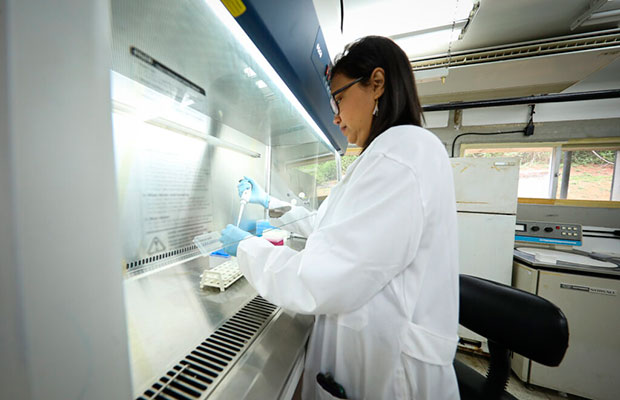
CIUDAD MCY.-El Ministerio del Poder Popular para Ciencia y Tecnología (Mincyt) y el Instituto Venezolano de Investigaciones Científicas (IVIC), impulsan un plan para contribuir con la eliminación de la malaria en el país.
“La orden de la Organización Mundial de la Salud (OMS) destaca la necesidad de entrar en una etapa de eliminación de malaria a nivel mundial; Venezuela lamentablemente ha tenido un aumento en los casos de malaria en los últimos años y ha habido un repunte”, comentó Mariana Hidalgo, investigadora del laboratorio de inmunoparasitología, del Centro de Microbiología y Biología Celular del IVIC.
La bióloga señaló que desde el centro de investigación trabajan para “apoyar a los organismos encargados de identificar de una manera más amplia el tema de la epidemiología en los distintos lugares. Aquí en el laboratorio trabajamos parasitología y ahorita, fundamentalmente estamos enfocados con la malaria, tenemos varias líneas de investigación en: epidemiología y diagnóstico de malaria”.
Explicó que el laboratorio cuenta con un diagnóstico propio “que es con una PCR isotérmica. Este diagnóstico se estandarizó aquí en el laboratorio y también estamos evaluando una manera de diagnosticar con muestras de orina, para evitar la extracción de sangre para el diagnóstico”.
¿Qué es la Malaria?
La malaria, también conocida como paludismo, es una enfermedad febril aguda provocada por parásitos del género Plasmodium que se propagan a las personas a través de la picadura de mosquitos del género Anopheles hembra infectados; se trata de una enfermedad prevenible y curable.
Los primeros síntomas del paludismo suelen darse entre 10 y 15 días después de la picadura de un mosquito infectado. Por lo general se tiene fiebre, dolor de cabeza y escalofríos, aunque estos síntomas pueden ser leves y es difícil atribuirlos al paludismo. De acuerdo con nota de prensa, en las zonas con paludismo endémico, las personas que han desarrollado una inmunidad parcial pueden infectarse, pero no experimentar síntomas, en estos casos se le denominan infecciones asintomáticas.
“Cuando una persona tiene Malaria, el síntoma más característico es una fiebre recurrente; la fiebre y escalofríos ocurren aproximadamente a la misma hora del día todos los días al principio de la enfermedad”, explicó Hidalgo.
Mencionó que el equipo de investigación realiza “epidemiología en zonas endémicas, principalmente en los estados Sucre, Bolívar, Amazonas, y recientemente abordamos zonas de los Valles del Tuy, estado Miranda”.
Explicó además que el objetivo de los abordajes es “evaluar cuáles son las especies que están circulando en la zona, tanto de parásitos como de los vectores de los Anopheles, ver si estos son sensibles o son resistentes a los antimaláricos y en el caso de los vectores, saber si ellos son sensibles o resistentes a los insecticidas que se están usando, porque eso permitiría controlar mucho mejor la transmisión”.
Eliminar un 90% de los casos de malaria para 2030
Hidalgo enfatizó que la meta establecida por los organismos de salud internacionales, es “eliminar el 30 por ciento de la casuística nacional para el año 2025 y 90 por ciento de la casuística para el año 2030, es lo que está enmarcado dentro del plan nacional de eliminación de malaria, articulado con los planes mundiales de la OPS y de la OMS”.
Dijo que en el IVIC hay grupos de antropología que viajan a las áreas indígenas y han traducido toda la información al lenguaje autóctono de cada sector, con el objetivo de llevar la información oportuna sobre la malaria hasta los lugares más recónditos.
En ese sentido, la investigadora remarcó que en los próximos días saldrán de campo para el «estado Sucre, porque queremos hacer campañas de concientización para que las personas sepan como resguardarse, como protegerse, como usar mosquiteros y hacer las fumigaciones».
Asimismo, indicó que el estado Bolívar presenta un foco de contagio en Tumeremo “pero también hay otros focos importantes en el país, en el estado Amazonas y Sucre”, que progresivamente las autoridades de salud estarán atendiendo.
AGENCIAS

